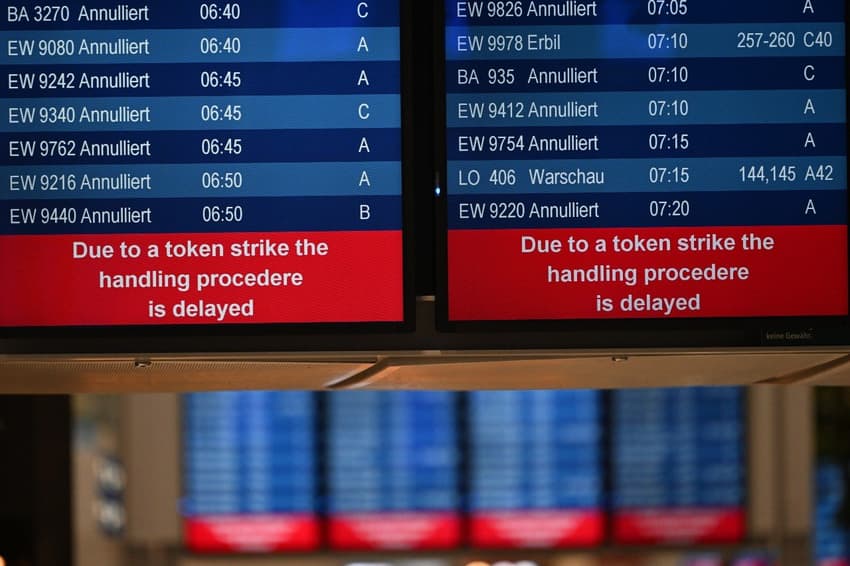UPDATE: German airports struck by travel chaos due to Friday strikes

For the third time in a month and the second time this week, the Verdi union has called for a walkout among ground staff at four German airports on Friday.
This time, airports in Cologne-Bonn, Düsseldorf, Stuttgart, and Karlsruhe are experiencing travel chaos.
Passengers were told to expect delays and cancellations starting Friday morning at the four airports, when security and customs staff are expected to take part in the “warning strike.”
Flights taking off from five cities are affected – as Cologne and Bonn share an airport.
Stuttgart Airport has already cancelled all departures and arrivals for Friday, with regular operations due to resume Saturday. The airport is advising affected passengers to contact their airline directly and not come to the airport Friday.
As part of an agreement with the its workers' union, Düsseldorf Airport is running a minimal, emergency service on Friday - so some flights will still go ahead, but will be severely disrupted. Many will still be cancelled altogether. Passengers are urged to check their flight's status and to keep hand luggage to a minimum to speed up security screening - which will likely see severe delays.
Cologne-Bonn, meanwhile, is expected to see cancellations and delays on both Friday and Saturday – due to how the shift schedules there work with the timing of the strike. Full service isn’t expected to resume there until Saturday afternoon. The airport says passengers should expect several cancellations, and to check directly with their airline to make any necessary alternative arrangements.
READ ALSO: What are your rights in Germany if a flight is delayed or cancelled?
The Verdi union, which called the strikes, is demanding a 10.5 percent pay rise - or an increase of at least €500 a month - for the public sector and aviation security employees it represents, to address rising cost of living.
Already this week, it brought air traffic going out of airports in Berlin, Hanover, Hamburg, and Bremen to a standstill. Only weeks ago, it staged walkouts at nine German airports, meaning that some of the affected airports this week have already seen their second strike in the space of a month.
The union’s warning strikes are being staged to put pressure on employers before the next round of collective bargaining on March 27th to 29th, following previous rounds that have broken down - with the exception of a deal Deutsche Post recently struck with postal workers.
Verdi’s head in Baden-Württemberg, Hanna Binder, said of the strikes: "Without better working conditions, we will no longer find enough people willing to take up these jobs on ground crews." These jobs are essential for air traffic safety in Germany, she added.
READ ALSO: EXPLAINED: Why are there so many strikes in Germany right now?
Comments
See Also
This time, airports in Cologne-Bonn, Düsseldorf, Stuttgart, and Karlsruhe are experiencing travel chaos.
Passengers were told to expect delays and cancellations starting Friday morning at the four airports, when security and customs staff are expected to take part in the “warning strike.”
Flights taking off from five cities are affected – as Cologne and Bonn share an airport.
Stuttgart Airport has already cancelled all departures and arrivals for Friday, with regular operations due to resume Saturday. The airport is advising affected passengers to contact their airline directly and not come to the airport Friday.
As part of an agreement with the its workers' union, Düsseldorf Airport is running a minimal, emergency service on Friday - so some flights will still go ahead, but will be severely disrupted. Many will still be cancelled altogether. Passengers are urged to check their flight's status and to keep hand luggage to a minimum to speed up security screening - which will likely see severe delays.
Cologne-Bonn, meanwhile, is expected to see cancellations and delays on both Friday and Saturday – due to how the shift schedules there work with the timing of the strike. Full service isn’t expected to resume there until Saturday afternoon. The airport says passengers should expect several cancellations, and to check directly with their airline to make any necessary alternative arrangements.
READ ALSO: What are your rights in Germany if a flight is delayed or cancelled?
The Verdi union, which called the strikes, is demanding a 10.5 percent pay rise - or an increase of at least €500 a month - for the public sector and aviation security employees it represents, to address rising cost of living.
Already this week, it brought air traffic going out of airports in Berlin, Hanover, Hamburg, and Bremen to a standstill. Only weeks ago, it staged walkouts at nine German airports, meaning that some of the affected airports this week have already seen their second strike in the space of a month.
The union’s warning strikes are being staged to put pressure on employers before the next round of collective bargaining on March 27th to 29th, following previous rounds that have broken down - with the exception of a deal Deutsche Post recently struck with postal workers.
Verdi’s head in Baden-Württemberg, Hanna Binder, said of the strikes: "Without better working conditions, we will no longer find enough people willing to take up these jobs on ground crews." These jobs are essential for air traffic safety in Germany, she added.
READ ALSO: EXPLAINED: Why are there so many strikes in Germany right now?
Join the conversation in our comments section below. Share your own views and experience and if you have a question or suggestion for our journalists then email us at [email protected].
Please keep comments civil, constructive and on topic – and make sure to read our terms of use before getting involved.
Please log in here to leave a comment.